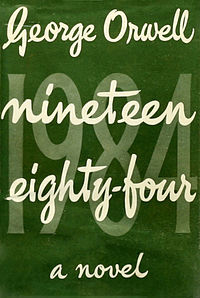I realize I'm being pretty vague, so let's look at some specific examples.
 | 1984 by George Orwell several themes (which is prefectly acceptable!). One (unrealistic!) theme is sexual repression; the Anti-Sex League and other influences basically eliminate sexual expression. Another theme is nationalism; those Party folks go way past reason to shore up loyalty, even obsession, to/for Oceania and its trappings such as Big Brother. Speaking of Big Brother, members of this society have no liberty, because they are under constant surveillance. In today, this theme is particularly chilling. Ultimately, though, readers find out it's all about power; the Inner Party members want total power over everyone else--including power over others' thoughts. Yikes! |
Turning to a more modern novel, Robert J. Sawyer's WWW:Wonder has a lot of intriguing themes. Two of the most obvious are the nature of consciousness and the issue of right and wrong. Can a machine become conscious? Could an animal? What is consciousness anyway? Do humans really understand right from wrong? How do increasing surveillance and technology affect what we do? Will we ever consistently do the right thing? Is there a moral arrow through time? This book is a very entertaining read and such themes just make it richer. |  |
Okay, how do you include a theme or themes in your work? What works for me is the following: When I finish a piece, I reread it; I try to clear my mind of what I thought I was going to say, and try to read what it really says. Usually there is a theme buried in there somewhere. Then, in revisions I tweak it to clarify the theme.
Good luck with your themes!
Monday, we have a fun post scheduled "U is for Urban Fantasy", so come back and check it out! :)

Great post!
ReplyDeleteI'll check back on Monday for my 'drug of choice', Urban Fantasy :)
I usually write the piece and let the reader extract the theme what they will. I do my best to steer clear of the preachy route as I really just want to let the reader have a good reading experience. But sometimes the theme just creeps in anyhow.
ReplyDelete